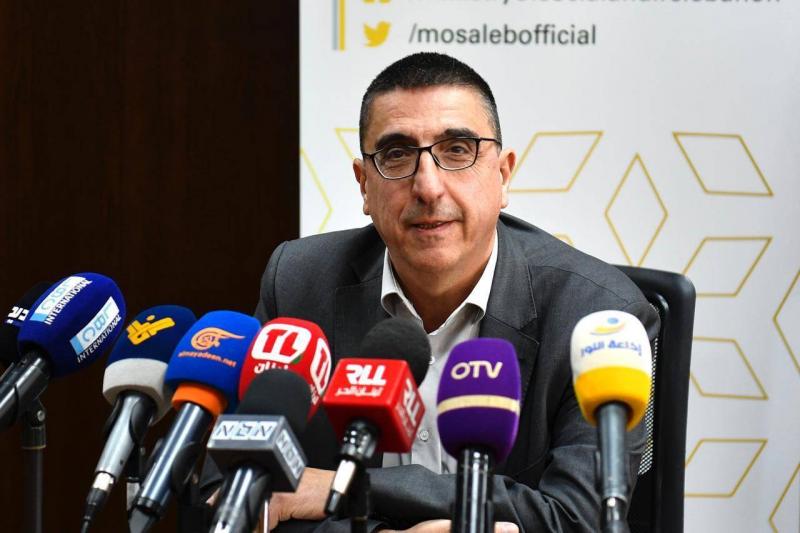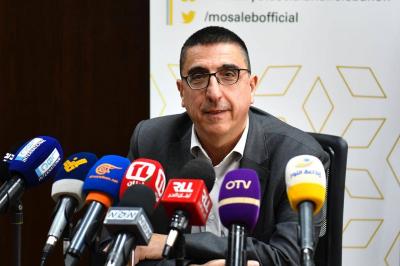Minister of Social Affairs in the caretaker government, Hector Al-Hajar, held a press conference in his office at the ministry, addressing recent developments regarding the Syrian displacement issue, the "Aman" program, and other files.
Al-Hajar began by discussing the topic of Ministry of Social Affairs employees, stating that there has been "injustice inflicted on many of them due to the presence of various types of contracts, including employee contracts, service expenses, and original contracts through the Civil Service Council, alongside contracts related to programs that occurred in the ministry," affirming that "we need any energy available in the ministry and we are not against those who wish to work."
He pointed out that "in the past two and a half years, no decision has been issued by the government to support the public sector without including a specific clause for the Ministry of Social Affairs, and that he has personally supported the rights of the employees of that ministry who are part of the public sector, whether they work in projects, as employees, or as service expenses, and we need them." He considered that "the problem lies elsewhere," stating: "When we approve increases, we must also approve advances, as these individuals do not have a number in item 13 or names in the state because of their contracts. Those under item 13 receive automatically upon the approval of increases, while the others, who number over a thousand, receive their wages through advances that must be approved as their budgets do not cover their salaries."
He saw that "the problem lies in the issue of advances," confirming that "the issue is not with me; I have done what I needed to regarding the government decision. As for the advances, I have prepared them dozens of times, and I have also requested transportation allowances several times. The clear answers were always rejection due to lack of funds and no response regarding the implementation of the decision."
Al-Hajar explained that he has repeatedly requested the inclusion of these employees in social security and continues to do so, expressing his discontent at the failure to secure social security for them and their families while withholding transportation allowances in return for their attendance at work, reiterating that he has done what he is supposed to at the political and executive levels, and that the outcome relies on others. He called on the Civil Service Council to fulfill its duties regarding the surplus in the Ministry of Social Affairs as we need them in other ministries.
He discussed the Aman programs, "the poorest" and "those with special needs," expressing his willingness "to submit a detailed report on this program, incorporating all information about the number of hours, follow-ups, and all the details that accompanied it in the ministries, as well as in the councils of representatives and ministers," indicating in this file that there is "a cart driven by ten horses, each pulling in a different direction," reassuring the Lebanese people that "very soon the delays, contracts, and problems in the 'Aman' program will be resolved and that we will reach a result. Those who received payments for 18 months in the past will receive again, and those who did not receive will have their payments completed."
He revealed that "regarding 'the poorest,' the number of visits reached 36,000 families who will be included in the Aman program, despite the fact that the working team has not received salary for over a year." He added: "There are successive steps in follow-up even though the cart is pulled by over ten horses, and despite the existence of bureaucratic glitches and daily problems, both local and external, I will not mention names to avoid upsetting anyone, but bureaucracy exists everywhere. When we receive any paper or transaction, we sign it without any delay and submit it. Despite all the issues, I want to reassure the people during this holy month and festive season that we have overcome all problems and will reach what must be secured as a right, not as aid."
He said: "In the past, we were accused that the beneficiaries of the program for the poorest families are the 36,000 families visited; less than ten percent of them had their cases re-evaluated, and it was found that they had become poorer. This is because we know the conditions Lebanese people are going through, and we recognize that if someone needs to enter a hospital, they become poorer for the next five years."
Regarding the Syrian displacement issue, Al-Hajar stated: "I had the opportunity to do an European tour in Paris and Brussels, I listened to their views and tried to understand the end of this significant impasse. What I heard is very important and confirms what I previously articulated when I took responsibility in the government. Today, the international community is promising to reduce support, stating there are no political solutions to the issue, while internally there are corporations involved in implementing assistance mechanisms who are reducing the number of beneficiaries. They have already reduced support and stopped it for Lebanese, and the same goes for Syrian families. They deal with the issue in numbers, saying if we have funds, we provide this amount, and if we do not have funds, we offer a different amount. All this talk is about numbers, as if we are in another world, disconnected from dealing with the poor and those living in tents with their humanitarian conditions being difficult whether they are Lebanese or non-Lebanese."
He added: "In their speeches, they say they stand firm with the Syrian refugees, but in reality, this is different; they actually say with a stroke of a pen that this is the number we can assist, and the other number we cannot assist. Is this happening in collaboration with the Lebanese state? Is this being considered along the lines of thinking about certain solutions or how these decisions affect the social stability of the country? Of course not; this is not how it happens."
He continued: "Ultimately, the main goal of linking trajectories and thinking of these fragmented solutions, in the short term, is to burden Lebanon with hosting such a large number of Syrian refugees. Rewarding Lebanon for hosting them is to load it with the burden. This issue is presented in different forms and offers and options, yet the core point remains that Lebanon is being burdened with the Syrian refugees."
Al-Hajar further clarified: "Today I explain to the Lebanese people, and yesterday I explained to the officials in a meeting of the ministerial committee, that we are in a delicate phase that can turn into a blessing, and we are ready to take responsibility for it. We are taking this file, after 12 years, in its humanitarian and political dimensions, to find a solution, or we may fail to do so and this phase could become a curse, leading to what is referred to as replacing the Lebanese people with Syrian refugees in Lebanon."
Regarding the south, Al-Hajar mentioned: "In the south, there is war, there are martyrs and destruction, and to this day no funds have been earmarked from the international community nor from the Lebanese government to support families whose homes and livelihoods have burned down. This is a cry at the thresholds of holidays; we must heed this danger and potential explosion. These people who were displaced and whose homes were destroyed, we need a bold decision to stand by them."
In response to a question regarding the intention to resettle Syrian refugees in Lebanon, Al-Hajar replied: "I used the expression clearly; there is a plan since the first day of change in the region, and Lebanon is part of this change. If we do not realize this matter at this historical moment, and if we keep shifting responsibilities, we will lose a very fundamental issue, and this time we will lose our homeland."




